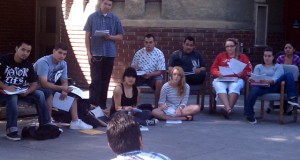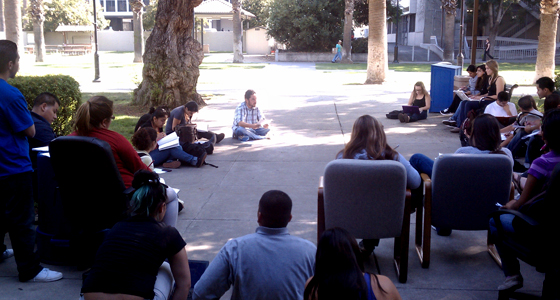By Sarah Kyo, Public Affairs Assistant

Mexican-American Studies students gather around mentor Felipe Ponce, foreground, at a midterm study session outside of Uchida Hall (Courtesy Photo).
When he was an undergraduate, Felipe Ponce faced difficulties in school. Now as a graduate student, he uses his personal experiences to help others.
“I try to use my struggle for my reason for being here,” he said.
Here at SJSU, Ponce provides students with something he didn’t have when he was earning his bachelor’s degree: a mentor.
Ponce is one of five Mexican American Studies graduate mentors who work with 330 students at this diverse campus.
SJSU ranked in the top 50 U.S. colleges and universities in 2010 for awarding undergraduate business, education, engineering, and social sciences degrees to Hispanic students , according to the Sept. 15 issue of “Diverse: Issues In Higher Education” magazine.
The university still has room for improvement in increasing retention rates among students of color, and the graduate mentor program tries to address this issue by reaching out to students and creating a support system.
“The typical model of student assistants is to help the professor,” said Marcos Pizarro, chair of the Mexican American Studies department. “We want to make them assistants to students, not assistants to professors.”
Relationships of Trust
The mentors each attend a specific section of Mexican Americans and the Development of U.S. History and Government, a two-part course that fulfills multiple lower-division general education requirements. Many of the students in these Mexican American Studies classes are freshmen, and some are first-generation college students.
“The program provided me with a mentor who was welcoming and didn’t mind taking time out of his busy schedule to help me,” said Carmelita Ramirez, a junior sociology major and Mexican American Studies minor.
During her sophomore year, Ramirez brought in her written assignments for her mentor Ponce to look over and provide feedback.
Mentors work with students in a variety of ways, including guest lecturing in class and organizing workshops. They also provide their own office hours in Uchida Hall, where students can have a place to study and look for one-on-one support, whether it is for this or other classes.
“What I try to reiterate to students is we’re here not just to help you guys pass this one class,” Ponce said. “We try a holistic approach. If you have a question, ask me.”
Jennie Luna, a Mexican American Studies lecturer, said the graduate mentors teach the undergraduate students survival skills for the rest of their college life.
“They have established wonderful relationships with students,” Luna said of the mentors. “They establish relationships of trust.”
A Growing Program
Since 2009, the graduate mentor program has evolved with support from the College of Social Sciences.
“We’re constantly fine-tuning and seeing what we can do better,” Pizarro said.
The department has reached out to the Educational Opportunity Program about supporting some Mexican American Studies students. The Asian American Studies program, which has a similar two-part general education course, has expressed interest in replicating the mentor program.
Pizarro said the graduate mentor program provides “a great contribution to the university’s mission of fully engaging all of its students.”

